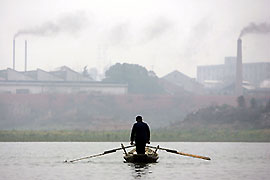China unveils climate action plan
Beijing sets targets for greenhouse emissions but says will not sacrifice growth.

As the world’s second largest emitter of greenhouse gases after the US, China is under growing international pressure to spell out targets for cutting its emissions.
Laying out measures to control China‘s greenhouse gas emissions, the report says the government will step up efforts to create a sustainable economy, to research and deploy new energy-saving technologies, and to plant more trees.
Caps ‘unfair’
 |
| China already has tough laws against polluters, but they are rarely enforced [GALLO/GETTY] |
Publishing China‘s first national plan on the issue however, officials rejected mandatory caps on emissions saying they were unfair to countries trying to catch up with the West.
“Developed countries should take the lead in combating climate change and the adverse effects thereof,” the report said.
Explaining the report, Ma Kai, the head of China‘s chief of China‘s National Development and Reform Commission, said global warming was largely caused by 200 years of unrestrained industrialisation by the West.
Mandatory emissions caps, he said, “would hinder the development of developing countries and hamper their industrialisation”.
The report highlighted “economic and social development and poverty eradication” concerns as priority areas for developing countries such as China.
A growing population and high contribution of coal to its power generation capability were also cited as impediments to combating global warming.
The government had set a goal of reducing energy consumption per unit of gross domestic product by 20 per cent by 2010, but fell well below its targets for 2006, the first year of implementation.
Tough laws
Al Jazeera’s Beijing correspondent Tony Cheng says that ironically China already has some of the toughest environmental legislation in the world, under which illegal carbon emitters are subject to serious punishment.
The problem is that while the legislation exists on paper, enforcing it has been another matter.
According to the International Energy Agency, China’s surging economy is expected to overtake the United States as the largest greenhouse gas polluter by the end of the decade or sooner.
Its per capita emissions though remain far below those of developed economies.
‘Positive’
The release of the Monday’s report came as China welcomed new US proposals on tackling global warming as a “positive change”, but stressed that any new agreements should not displace the main UN treaty on global warming.
“We believe that the new initiative of the White House should be a useful complement to the UN Framework Convention and the Kyoto Protocol and not a substitute for the two international documents,” Ma Kai told reproters.
Last week George Bush, the US president, announced plans to gather representatives from 15 nations, including China, to discuss and formulate long-term goals to combat global warming by next year.
But the new US proposal is seen as coming outside the UN Framework Convention on climate change that was agreed to in 1992 and the Kyoto Protocol, which the United States did not ratify.
Ma said China agreed with the US that the fight against climate change should not impact economic growth and welcomed Bush’s proposal to facilitate technological transfers between developed and developing nations.